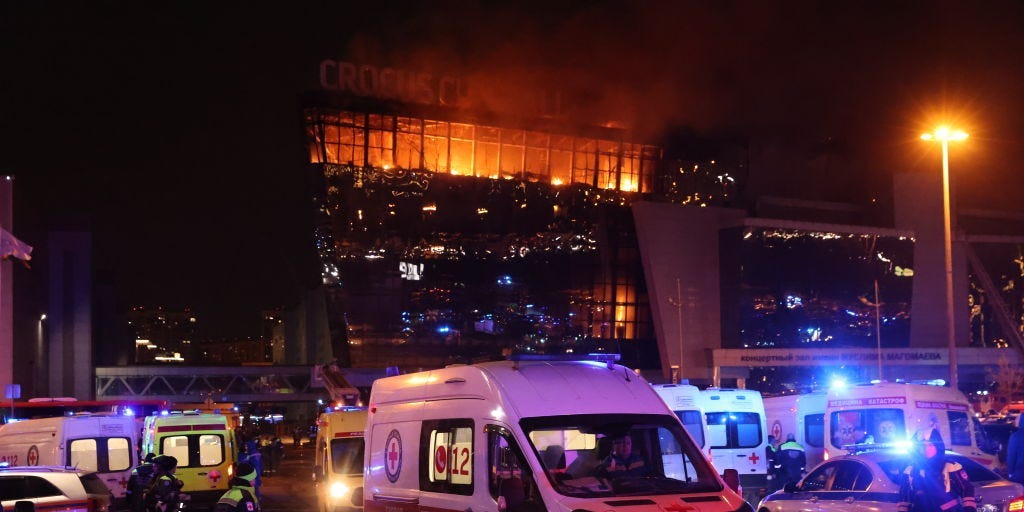- Armed assailants attacked a concert hall near Moscow on Friday, Russian state media said.
- At least 130 people were killed and more than 100 injured, the news agency said.
- ISIS-K, a branch of the Islamic State, claimed responsibility for the attack.
At least 133 people were killed and more than 145 injured when gunmen opened fire at the Crocus City Hall music venue near Moscow on Friday, Russian state media TASS reported, citing Russia's Investigative Committee.
Given the number of reported casualties, this would be one of the deadliest attacks near the Russian capital in recent years.
Here's what we know so far:
what happened?
An unidentified group opened fire Friday night at Crocus Town Hall, a music venue on the western edge of Moscow.
According to the Associated Press, four people suspected of being directly involved in the attack have been arrested. Russian President Vladimir Putin, in his first comments on the massacre Saturday afternoon, said Kremlin authorities had detained a total of 11 people suspected of being involved in the attack.
Russian rock band Picnic was scheduled to perform at the venue, TASS reported. The concert hall can accommodate approximately 6,200 people, according to the venue's website.
More than 133 people were killed and about 145 injured, according to the Associated Press. Russian Health Minister Mikhail Murashko told a local news channel that children were among the injured, according to TASS news agency.
TASS reported that an explosion soon occurred, shaking the building and causing a fire. The Ministry of Emergency Situations told Russian News Agency that a third of Crocus City Hall was engulfed.
Who is claiming responsibility?
Immediately after the attack, the Islamic State Khorasan Province (ISIS-K), a branch of the Afghan terrorist organization, claimed responsibility for the attack in a statement shared on ISIS-affiliated news agency Amaq and Telegram, CNN reported.
According to the New York Times, US authorities have confirmed that the group was responsible for the attack.
Despite confirmation from US officials, Putin did not mention ISIS-K, instead naming Ukraine. In a speech on Saturday, he claimed that Kiev authorities were trying to help the four attackers escape.
“They moved towards Ukraine in an attempt to hide, but preliminary data shows that a window was prepared on the Ukrainian side to cross the state border,” Putin said, according to NPR.
Ukrainian and U.S. officials later denied any suggestion of Ukrainian involvement.
“ISIS is solely responsible for this attack. Ukraine was not involved in any way,” National Security Council spokesperson Adrian Watson said in a statement Saturday, according to NBC News.
Mykhailo Podlyak, an adviser to Ukrainian President Volodymyr Zelenskiy, also denied the Kremlin's accusations, saying on TV program X: “Ukraine certainly has nothing to do with the shooting and explosion at Crocus City Hall.”
“It makes no sense at all,” he wrote, adding that an attack on Moscow would “lead to a sharp increase in military propaganda, accelerated militarization, increased mobilization and, ultimately, more war.”
What is ISIS-K?
ISIS-K, an affiliate of the Islamic State, was formed in 2015 and is made up mostly of defected Pakistani militants, according to the Center for Strategic and International Studies (CSIS), a Washington, D.C.-based think tank.
BI previously reported that the branch is considered one of the Taliban's mortal enemies, mainly due to sectarian differences.
According to CSIS, the branch was responsible for about 100 attacks against civilians in Afghanistan and Pakistan so far in 2018. However, the group attracted international attention in August 2021 when it carried out a suicide bombing at Kabul's Hamid Karzai International Airport, killing 13 US soldiers and 169 civilians.
ISIS-K is considered “one of the most successful branches” of the Islamic State, CSIS counterterrorism and Middle East expert Daniel Byman told Business Insider.
Why would ISIS-K target Russia?
ISIS-K's hostile relationship with Russia can be traced to several major historical conflicts that reflect the country's brutal treatment of Muslims.
“If we want, we can go back to the days of Russia's conquest of the Caucasus,” Byman said. “And then in the 1940s you could go for the deportation of Muslims by the Soviet Union.”
Bayman told BI that he often pointed to the intermittent wars in the small Muslim republic of Chechnya in the 1990s and 2000s, during which time Chechnya struggled for independence.
Michael Kugelman, director of the Wilson Center, a Washington-based think tank, told Reuters that ISIS-K “views Russia as complicit in its regular repression of Muslims.” Ta.
Why did the attack happen now?
Byman said the rationale behind the timing of Friday's attack was not yet clear but was likely related to “operational” reasons rather than symbolic or political purposes. .
If ISIS-K is confirmed to have carried out the attack, Byman said the group may have carried out the attack on Friday simply because it was prepared.
On March 7, the US Embassy in Russia warned Moscow of reports of “extremists” planning to “target large gatherings” near the Russian capital.
The warning was based in part on intelligence indicating an ISIS-K presence in Russia, two U.S. officials told The Washington Post.
Three days before the attack, President Putin ignored the warning, calling it “provocative.”
Colin P. Clark, an expert on domestic and cross-border terrorism at the Soufan Group, a global security consulting firm, told the New York Times that ISIS-K has become obsessed with Russia over the past two years. There is,” he added. He accuses the Kremlin of shedding Muslim blood. ”
A Kremlin spokesperson and the U.S. Embassy in Russia did not respond to requests for comment.

